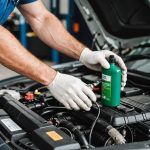Every car enthusiast knows the pride of maintaining a well-functioning vehicle. Whether you’re a seasoned driver or in the early days of your driving journey, auto maintenance is a crucial part of owning a vehicle. In the hustle and bustle of everyday life, it’s easy to overlook minor issues or delay necessary inspections. However, not all car troubles require a professional touch. Some you can tackle on your own, while others demand expert attention. Let’s explore how to discern when your car requires a professional inspection and when it’s a simple fix you can handle.
Understanding the Basics of Auto Inspection
Before diving into the specifics of car issues, it’s important to understand what an auto inspection entails. A professional inspection covers a thorough check of your vehicle, including the engine, tires, fluid levels, and overall safety features. These inspections help detect potential problems before they escalate, saving you time and money down the line.
Also to read : How can you improve your car’s fuel efficiency without sacrificing performance?
Every car owner should be familiar with basic maintenance tasks. These include checking the oil level, ensuring tire pressure is optimal, and verifying the functionality of lights and brakes. By staying informed about the condition of your vehicle, you can better judge whether a problem requires a DIY solution or professional help.
A key aspect of vehicle care lies in routine maintenance. Regular oil changes, filter replacements, and brake checks are essential to the longevity and performance of your car. While some tasks can be managed at home, others necessitate a professional inspection to guarantee the safety and efficiency of your vehicle.
In the same genre : How can you identify and fix common electrical issues in your vehicle?
Identifying Common Car Issues You Can Fix Yourself
There’s a certain satisfaction in rolling up your sleeves and getting hands-on with your vehicle. Not every hiccup needs a trip to the mechanic. By familiarizing yourselves with common car issues, you can save time and avoid unnecessary expenses.
1. Fluid Levels: One of the simplest checks involves assessing your car’s fluid levels. Make a habit of examining the oil, coolant, brake fluid, and windshield washer fluid regularly. Low levels can often be topped off at home, ensuring your vehicle runs smoothly.
2. Tire Care: Tires are vital for the safety of your vehicle. Regularly inspect your tires for wear and tear. If your tire treads appear worn or uneven, it might be time for a replacement. However, keeping an eye on air pressure and rotating your tires can often prolong their life.
3. Battery Health: A dead battery can be a simple fix. Keep jumper cables handy and ensure the battery terminals are clean and free from corrosion.
4. Wiper Replacement: Tire and engine issues aside, visibility is crucial. If your wipers are streaking or failing to clear the windshield, a quick replacement can usually be handled without professional help.
By mastering these basic tasks, you can address minor problems without turning to a professional for every hiccup.
Signs Your Car Needs Professional Attention
While some issues are easily managed at home, certain signs indicate the need for a professional inspection. Recognizing these signs early can prevent more severe problems from developing.
1. Unusual Noises: If you hear grinding, thumping, or squealing sounds from your engine or brakes, it’s time to consult a professional. Unordinary noises often signify deeper issues that require expert diagnosis.
2. Dashboard Warning Lights: Modern vehicles are equipped with warning systems that alert you to potential problems. Don’t ignore these signals. Whether it’s the check engine light or a brake warning, these indicators generally require a professional inspection to resolve.
3. Leaks and Odors: Leaking fluids or unusual smells can be a red flag. While topping off fluids is routine, persistent leaks suggest deeper issues needing professional help.
4. Performance Changes: If your car’s acceleration, braking, or handling feels off, it might be time for a thorough inspection. These changes could reflect problems with the engine, suspension, or transmission that require specialized repair.
When in doubt, turning to a professional ensures both your safety and the reliability of your vehicle.
The Importance of Regular Professional Inspections
Routine professional inspections are integral to maintaining a healthy car. While many tasks can be managed independently, professional expertise offers a comprehensive analysis that DIY approaches might miss.
1. Detailed Engine Inspection: Professionals provide a deeper understanding of your engine’s condition. They can identify subtle issues that could develop into significant problems if left unattended.
2. Tire and Brake Assessment: While checking tire pressure and tread is possible at home, professionals offer insights into alignment and balance, ensuring optimal safety and performance.
3. Fluid Analysis: Mechanics can test fluid quality, not just levels. This analysis helps identify potential problems with more precision, such as contamination or degradation.
4. Comprehensive Safety Check: Ensuring that all safety features, from airbags to seatbelts, are functioning correctly is paramount. Routine inspections provide peace of mind, knowing that all aspects of your vehicle have been professionally evaluated.
Investing in regular professional inspections is an investment in safety, reliability, and longevity, ensuring you and your passengers remain secure on the road.
Owning a car is a journey that melds convenience with responsibility. Being proactive about maintenance and inspections empowers you to keep your vehicle in prime condition. While some issues are manageable on your own, never underestimate the value of a professional inspection. By understanding the signs that indicate when your car needs expert help, you ensure it remains a safe, reliable companion on all your journeys. Remember, in the world of vehicles, an ounce of prevention is worth a pound of repair.











